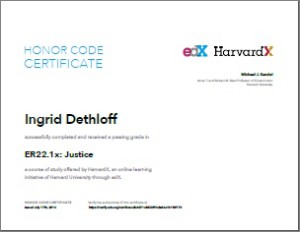Nach 1 Jahr Pause möchte ich mein Blog wieder aktiv nutzen und da bietet sich doch ein Jahresrückblick zum Thema MOOC an. Nach dem intensiven MOOC-Jahr 2014 habe ich es 2015 ruhiger angehen lassen und stattdessen in einige Plattformen reingeschaut ohne das Ziel, einen MOOC wirklich intensiv mitzumachen. Ein persönlicher chronologischer Rückblick.
Im Februar schrieb ich mich auf der zentralen französischen MOOC-Plattform FUN ein (die auf Open edX basiert und mir schon deshalb sympathisch ist). Mein Französisch reichte mir dann aber doch nicht, um der von der Thematik her sehr interessanten Reihe „Mon ordinateur dans le nuage“ folgen zu können. Dennoch freue ich mich über den Erfolg von FUN, über den Prof. Mongenet vor wenigen Tagen auf der Learntec berichtete: „From a start-up like project to a public organization“. (https://www.france-universite-numerique-mooc.fr/)
Ende Februar startete der 7-wöchige „Lehrer2020-bw“-MOOC, eine Online-Fortbildung für Lehrer/innen zum Einsatz mobiler Endgeräte. Vom Ministerium gefördert und vom KIT umgesetzt, wurden viele selbst gedrehte Videos angeboten mit Forenaufgaben zu Aspekten wie Verwendung der Smartphone-Kamera, Urheberecht etc. (https://lehrer2020-bw.fsz.kit.edu/) Bemerkenswert fand ich die Zielgruppe Lehrer; auf der anderen Seite kam bei mir nie ein richtiges MOOC-Feeling auf – lag vielleicht auch an der Plattform und/oder der deutschen Kurssprache.
Spannender für mich war im Mai der KLOOC der TU Kaiserslautern auf der Plattform mooin: Das Kapitel 1 mit dem Einführungsüberblick zu Nachhaltigkeit (sollte zum Allgemeinwissen gehören) hat mir sehr gut gefallen und wurde mit einem Badge belohnt. Parallel war es schön zu erleben, was man aus Moodle durch gutes Design alles machen kann – ein Lob an das mooin-Team aus dem Norden. (https://mooin.oncampus.de/mod/page/view.php?id=784)
Im Juni loggte ich mich mal wieder bei Coursera ein, um aktuelle Beispiele der dortigen Kursgestaltung zu sehen. „Enhance Your Career and Employability Skills!“ der University of London konnte man gut als Selbstlernkurs nutzen, den Vortragenden hörte ich wirklich gerne zu und in den Videos gab es gute Ansätze zur eigenen Reflektion (auch wenn man den Job gar nicht wechseln will). Zeitlich parallel hatte ich mich in den Kurs „Paradoxes of War“ (Princeton University) eingeschrieben – sehr engagiert und für Geschichte motivierend, aber zu tieferen Studien fehlte mir dann leider die Zeit.
Im September 2015 wurde ich als DALMOOC-Teilnehmer beider pathways (edX and ProSolo) angeschrieben und bekam von Matt Crosslin das Angebot, an einer DALMOOC Research Study teilzunehmen. Da habe ich natürlich gerne mitgemacht (Fragebogen statt Interview) und bin nun gespannt auf die Ergebnisse, die wohl Anfang 2016 veröffentlicht werden sollen.
Nachdem ich 2014 so begeistert war von dem Justice-MOOC auf edX, habe ich mich für den 3. (?) Durchlauf eingetragen, hatte aber den Eindruck, dass dort inhaltlich nichts Neues war und nun fühlte sich das Ganze irgendwie doch sehr nach Konserve an, was vielleicht auch daran lag, dass sofort alle Module freigeschaltet waren und eben keine Taktung der Materialien mehr stattfand. Interessant für mich war daher lediglich am 7. Oktober 2015 das AMA mit Prof. Sandel auf Reddit. Naturgemäß reichte die Zeit natürlich nicht für alle Fragen (auch nicht für die Beantwortung meiner Frage), aber dafür gab es auf einige wenige Fragen sehr ausführliche Antworten. (https://www.reddit.com/r/IAmA/comments/3nuzvt/i_am_michael_sandel_political_philosopher_author/)
Ende Oktober schaute ich dann mal wieder bei iversity rein, und zwar in den „Climate Change & Health for Policy-Makers“, wo ich überrascht war, dass ich schon beim Durchscrollen der Videos parallel eine Mail mit gestylter „Teilnahmebescheinigung für den Kurs“ erhielt… Immerhin kostenlos, denn die vielen Werbemails von iversity für Rabatte auf Kurse und Geschenkgutscheine zeigen ja nicht nur die Richtung, wo es dort hingeht, sondern nerven für meinen Geschmack langsam auch.
Alles in allem für mich ein Jahr ohne ganz große MOOC-Momente; ich bin gespannt was 2016 bringen wird. Allerdings kann ich mir nicht vorstellen, für einen MOOOC zu zahlen, und das reduziert das potenzielle Angebot (Coursera fährt ja ab 2016 auch eine andere Preispolitik, s. https://blog.coursera.org/post/137649201147) schon etwas.

